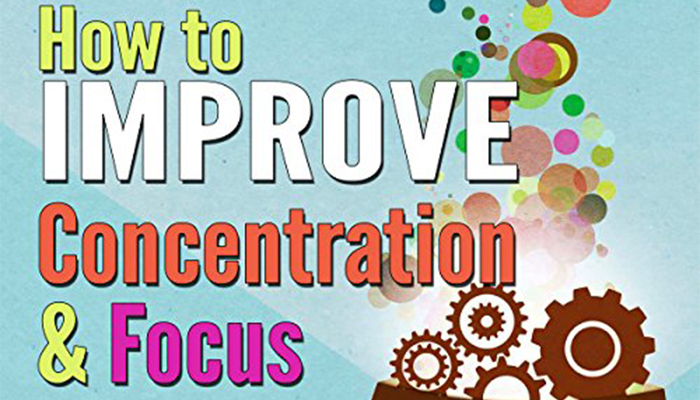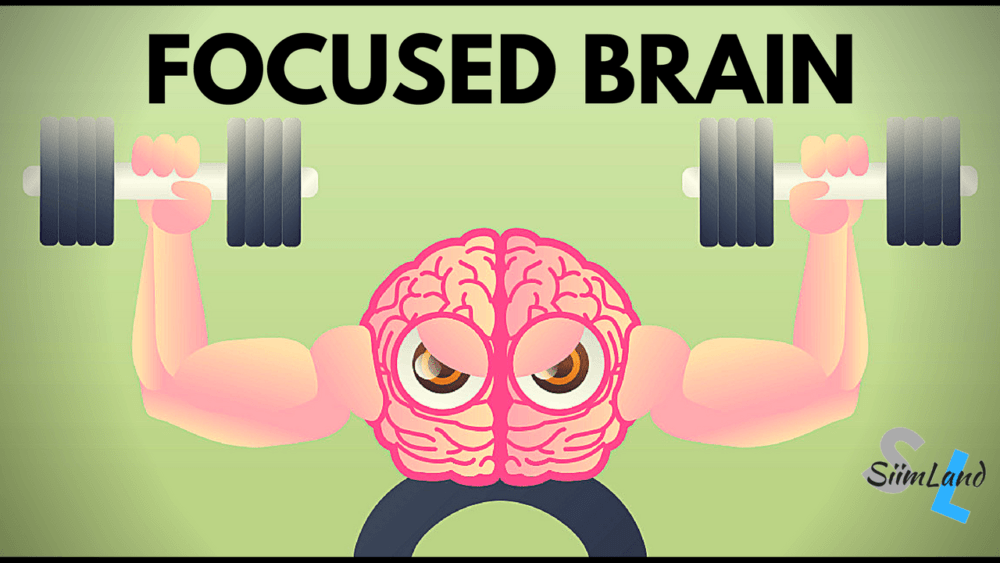It might be difficult to stay focused, but it can be especially difficult if there are continual outside distractions. Distractions are only a click away in today’s always-connected society, making it much harder to learn how to concentrate. Read carefully about How To Get Your Brain To Focus And Concentration.
Even in peaceful situations, you might easily become distracted when you check your social media notifications or the most recent news stories. But achievement requires mental concentration. For learning new things, completing goals, and doing effectively in a variety of settings, the capacity to focus on something in your environment and devote mental effort toward it is essential.
Even if it is possible, developing greater mental attention doesn’t usually happen quickly or easily. If it were easy, we’d all be able to focus with the acuteness of a professional athlete. You’ll need to put in a lot of work, and you might have to alter certain everyday routines.
Everyone has been in this situation: sitting at a desk with a pressing deadline and an unfocused mind. Despite your best efforts, nothing has changed. You must concentrate on the task at hand. You’re inspired to complete it. But you simply can’t focus.
——————————————————————————————————————–
What Is Concentration?
Concentration is the capacity to direct one’s attention in accordance with one’s will, according to Remez Sasson in his book Will Power & Self Discipline. Controlling attention is what concentration is. It is the capacity to keep one’s attention on a single thing or idea while blocking out all other irrelevant thoughts, ideas, feelings, and sensations.
For most of us, that last component is the most challenging. In order to focus, one must block out or stop focusing on all other irrelevant thoughts, ideas, feelings, or sensations. Our everyday activities are dominated by logging on and off of our computers and mobile devices. WhatsApp, email, Telegram, and the half-dozen other apps that are supposedly essential to our job constantly flood us with messages. In order to do our everyday tasks or find solutions to our difficulties, we look for knowledge continually.
Constant interruptions reduce productivity. The task takes longer to complete. We are not as attentive. With our partners or with coworkers, we don’t grasp things as well, which leads to misunderstanding, misinterpretation, and conflict. Memory is impacted. Our personal lives and professional reputation are impacted when we forget things or have trouble recalling knowledge quickly.
——————————————————————————————————————–
Why We Can’t Focus?
Many people ask this question frequently. You’ve probably asked yourself this question if you frequently try to multitask or have trouble finishing even the smallest activities. And frequently, the solution is found in the things you do every day and in those things you can control. These can include:
- Your bedtime routine and sleep hygiene
- Not getting enough sleep
- Not eating nutritious meals or sufficient calories throughout the day
- Having your phone and other electronics within your view
- Dependents or coworkers needing your attention
- Your day is structured out of sync with your ultradian rhythm
You are overly stressed or burnt out - You do not get enough physical activity throughout the day
——————————————————————————————————————–
15 Ways To Improve Your Concentration
You now understand why you require attention-related assistance. What might aid in sharper concentration? There isn’t a single way to increase focus, however the advice below can be useful.
01. Practice mindfulness and meditation –
Focus can be strengthened, mental fitness can be increased, and mindfulness exercises can help. Our entire body relaxes and our brain gets more tranquil while we are meditating. Throughout the procedure, we pay attention to our breathing to avoid being sidetracked by our thoughts. We may develop the ability to use our breath to focus our attention on a certain job again so that it can be completed effectively even if we are interrupted with practice.
To begin, breathe deeply multiple times, paying close attention to each breath. Gently and uncritically direct your attention back to your deep breathing when you notice that your mind is naturally starting to stray. You might discover that this task—which seems to be deceptively simple—is far more difficult than it first appears.
Happily, you can practice this breathing technique whenever and anywhere you like. You’ll probably discover that over time, it gets less difficult to ignore bothersome ideas and shift your attention back to what’s important.
02. Get more sleep –
Your sleep is impacted by numerous variables. One of the most frequent ones is reading on a computer, phone, or tablet, or viewing your favorite movie or TV show on an LED TV just before bed. The blue end of the spectrum is where these devices generate their light, according to research. The retina in your eyes will be stimulated by this light, and it will stop melatonin from being secreted, which would otherwise encourage sleep anticipation.
To reduce such blue light, put on a filter or “blue light” glasses, or stay away from any electronics an hour or two before bed. Avoiding activity in the afternoon, drinking enough of water throughout day, journaling or using breathing exercises to calm the mind are all additional ways to enhance sleep. Another strategy is to establish a regular nighttime routine and plan.
03. Live in the Moment –
Even though it may seem paradoxical when you’re having trouble focusing, keep in mind that you get to choose where you put your attention. When your thoughts are constantly in the past or in the future, it is difficult to concentrate. Make an attempt to let go of the past, even when it’s difficult. After acknowledging the impact, how you felt, and what you took away from it, let it go.
Similarly, be aware of your worries about the future, take note of how your body is expressing your fear, and then decide to let it go. We want to train our mental resources to focus on the details of what matters at the moment. Our minds go in the direction we choose to focus.
04. Eliminate distractions
Being constantly inundated with information makes it difficult to concentrate. Blocking apart time in your schedule for a certain work or activity should become second nature. Request privacy during this time or move to a location where others are less likely to bother you, such as a library, coffee shop, or private room.
Shut down social media and other apps, turn off notifications, and tuck your phone away in a bag or backpack. According to studies published in HBR, not merely turning off the phone but also removing it from sight greatly improved cognitive function. Keep Your main priority is to finish what needs to be done. You can focus better if you turn off both internal and external distractions.
05. Reduce multitasking
In an effort to feel productive, we try to complete several tasks at once. It’s a recipe for decreased productivity, lowered attention, and bad concentration. Burnout may result from poor productivity. Multitasking includes activities like replying to emails and podcasts while doing other things, such as preparing a report and making phone calls. The quality of your job suffers as a result of such multitasking, which also impairs your capacity to focus.
06. Take a short break
The fact that your focus may start to wane after concentrating on something for a while may also seem illogical. It could become more and more difficult for you to focus on the task at hand. Our brains have been shown to ignore sources of continuous stimulation, according to researchers.
After that, you can significantly increase mental concentration by taking very brief gaps and shifting your attention somewhere else. Take a break when you start to feel stuck on a project the following time. Switch tasks, get up and walk around, or even talk to someone. You’ll return with a more concentrated mindset to maintain your high level of performance.
07. Train your brain
Adults’ ability to improve their cognitive skills, particularly concentration, through brain training exercises is beginning to be supported by scientific study. You may improve your short-term and working memories, cognitive speed, and problem-solving abilities by playing these brain training games for concentration. Jigsaw puzzles, sudoku, chess, and brain-challenging video games are some examples of these games.
08. Connect with nature
According to research, even the presence of plants in an office can improve the air quality, boost productivity, and improve worker satisfaction. Making time to enjoy your garden or go for a walk in the park might improve your focus and make you feel more refreshed.
09. Listen to music
It has been demonstrated that music has healing benefits on our brains. Light music may improve your ability to concentrate, but other music may divert you. According to most experts, music with lyrics and human voices can be distracting, but classical music and natural sounds like water running are good alternatives for focus. Many apps and services provide background music and soundscapes created for various types of attention and work needs.
10. Exercise
Simple exercise is a great way to start your day. Regular exercise releases chemicals essential for memory, focus, and mental clarity, according to the Harvard Men’s Health Watch issue from May 2013. The brain’s dopamine, norepinephrine, and serotonin levels can all be increased with exercise, and this will improve focus and attention.
When compared to people in poor physical condition, individuals who participate in sports or some other sort of exercise score better on cognitive tests. The body’s tension can be relieved by engaging in physical activity. Your mind will feel better when your body does since the two are so intertwined.
11. Set a daily priority
Every day, ideally the night before, write down your goals and choose one top priority that you’ll commit to completing. By doing the large tasks first and saving the little things for last, this will help you concentrate your mind on what really counts. So that you won’t feel overwhelmed, divide major chores into smaller chunks. By determining your genuine priorities, you may reduce distracting anxiety, and by meeting tiny daily targets, you can rewire your brain to succeed.
12. Eat well
Pick foods that maintain energy, help the brain stay fueled, and help control blood sugar. High-fiber foods, fruits, and vegetables can help you maintain stable blood sugar levels. Reduce the intake of sugary foods and beverages that make your blood sugar levels rise and fall and make you feel lightheaded or sleepy. To work effectively, your brain need a lot of healthy fat. Healthy fats can be added to your diet through nuts, berries, avocados, and coconut oil, which will all improve the functioning of your brain.
According to research, fruits like blueberries can improve focus and memory for up to five hours after consumption because they contain an enzyme that promotes the flow of blood and oxygen to the brain, improving memory as well as our capacity to concentrate and remember new information. Potassium, found in leafy green foods like spinach, speeds up the connections between neurons and improves brain function.
——————————————————————————————————————–
Other Treatment Options
Consider consulting a specialist if this advice doesn’t work. Even if you’re not aware of it, something more serious than typical distractions could be impairing your focus. Starting with a therapist might be beneficial, particularly if you’re stressed out or have seen changes in your mood. Sometimes it requires a qualified expert to identify these signs.
Many adults with untreated ADHD struggle to focus their attention or concentrate for extended periods of time. An expert in mental health can help you identify this or any other illness, as well as assist you begin therapy. Once you receive a diagnosis, therapy, medication, and other treatment options can help you feel better. To increase their focus, some people take prescription or illicit medicines, such as nootropics. However, some of these substances can have very negative side effects. Never take a medication unless a doctor has prescribed it for you, and always heed the doctor’s advice.
——————————————————————————————————————–
Improving Focus And Concentration Takes Time
Some techniques for increasing focus may be effective while others may not seem to have much of an impact on you. Think about trying a variety of strategies to see what works. The merits of some approaches, including brain training, are still up for debate among experts. However, the available research indicates that many people can benefit from the majority of these suggestions by improving their concentration at least somewhat. These suggestions are also unlikely to impair concentration or result in any other bad consequences, so using them shouldn’t have any unfavorable repercussions.
It takes time to develop your focus and concentration; it does not happen quickly. Professional athletes like golfers, sprinters, and gymnasts prepare for a long time (and typically have a coach) in order to focus and execute the appropriate action at the right time to attain perfection.
We hope you enjoy our article about How To Get Your Brain To Focus And Concentration.
Knowledge World Blog- WWW.KNOWLEDGEWORLD.BLOG
Visit Our Online Shop Website- WWW.CEYLEBRITY.COM
Ceylebrity Sinhala News- WWW.CEYLEBRITYNEWS.LK
Share








